- Home
- Tim Lebbon
The Thief of Broken Toys Page 7
The Thief of Broken Toys Read online
Page 7
“What?”
“Such wonders, here,” he said. “I know you’ll welcome them.”
“But — ”
“Watch,” the old man said quieter. “Learn.” And he went about fixing the toy.
A million questions crowded in, confusing Ray, making him queasy and dizzy. But the moment the man opened the tool cabinet by his side, Ray was enrapt. He watched in wonder, questions and concerns ushered back and hidden away for a while in the darker corners of his mind.
Some of the tools were obvious, but the man quickly started using things — doing things — that made no sense. Ray frowned, squinting, trying to see past the strange actions and understand the weird implements. But moments later, the man sat back and the toy was alone on the table before him, and Ray was none the wiser.
“That’s it?” he asked.
“You weren’t watching?” The old man turned the toy on and pushed it gently across the table. A buzz-saw noise rose and fell, lights flashed through its speckled plastic case. Ray closed his eyes, because the last time he’d heard that, Toby had been alive. When he looked again, only a second or two later, the man stood before him, holding out the toy in his hand.
“Here,” he said. “For you.” He looked very tired. He hadn’t before — until now, Ray had marvelled at how good the old man looked — but he suddenly seemed faded. His skin was paler, his eyes deeper. “And now I’ve done for you, I want you to do for me.”
“Do what?” Ray asked.
“Take over. I’m old, and . . .” The man looked back at the toys still hanging on the wall. “And I can’t help everyone. It’s not fair. It was never part of the deal.”
“Deal?”
“Say you will,” the man said, intense. “Say you will, and I’ll tell you everything. How it came about, the grief that consumed me, the joy I felt when he came and asked me to . . .” He waved at the toys, gaze never once leaving Ray’s eyes.
“I can’t,” Ray said, not a refusal, simply a statement of fact.
“You must!” the man said. He came close, and for the first time Ray was scared of him. He was old, yes, and he looked like the next sea breeze would break him. But there was something about him — there always had been — that seemed not quite here. Not quite right. A distance in his eyes, perhaps, but a power in his stance as well. He might have weaker, older muscles, but there was a strength to him that defied understanding. And now he scared Ray to death.
Ray backed away three or four steps, feet leaving the wooden floor boarding and tangling in plants and roots. The old man stopped and grinned, something twinkling in his eyes. And Ray felt the weight of nothing behind him.
He glanced back quickly and dizziness hit him. Three more steps and I’d have been over, he thought, and the sea surged into the cliffs two hundred feet below him. Months back, that would have been his wish, but now he suddenly had something to live for. He wasn’t sure what, but he did understand that this old man had given it to him.
“Really,” Ray said, hands out in a pleading gesture. “Thank you. Thank you! But . . .” He nodded at the strange open room, the tools, the broken toys. “I just can’t. I don’t know any of this.”
“You think I did when it happened to me?” the man said. He didn’t shout, and Ray thought he probably never had. He conveyed the world in a whisper. “I’m trapped here,” he said, and he seemed suddenly hopeless, wretched. A thing of power in bondage.
“I’m sorry,” Ray said. He started away from the stone hut, along the cliff parallel to the edge. It was tough going, and he kept glancing back at the man watching him from the tumbled front façade of the strange building. How did he get those things in there? Ray thought. How does he keep them dry, keep it safe? How does he live in there? But losing sight of the tool cabinet and the incongruous timber flooring seemed to erase them from his mind.
“I can take it all back,” the man said. “Don’t think because I’ve fixed your memories they’re yours forever.”
“You didn’t fix my memories!” Ray said.
“Think what you like. Just . . . won’t you listen? Can’t you just hear me?” He was not quite pleading. Not quite.
Ray was thigh-high in undergrowth. Thorns pricked at him, and looking down he couldn’t understand how he’d become so entangled.
“Please?” the old man said.
Ray pushed on toward home, and the safety of precious memories. Never for an instant would he consider what the old man had asked. Never for a moment could it be a possibility. And when he looked up again, the old man was gone.
“Hello?” Ray shouted. There was no answer. “Hey. You still there?” But there were no sounds here other than the cliff sounds, the sea sounds, and the breath of the breeze. He stared at the stone building, trying to discern anything out of the ordinary. Could the walls he looked at really be lined with broken toys on the other aside? He thought not. Were there really plants ripped from the mortar, timber flooring laid, furniture installed? Of course not. That was ridiculous, product of some part of his mind he’d lost sight of since Toby’s death. That part was making itself known again, dragging him from the brink of despair in a subconscious attempt to rescue his own sanity.
It was all in his head.
“And now I’m stuck out here,” he said. Laughter rumbled inside. He swallowed it, but it was persistent. He noticed a flash of colour closer to the cliff path, just a few feet away, and as he worked his way toward it — ignoring the pain, and ignoring that fact that he’d been hallucinating something so clear, so defined — he realized what it was. The saw toy.
He plucked the toy from the bushes and placed his thumb on the switch. He paused only for a moment, and then flicked it on. Broken. Of course.
How could he think anything else?
It was late afternoon by the time he arrived home. Not sure exactly where all the time had gone, Ray locked the door and dropped the toy saw into the kitchen bin. He’d have no need of it again, and neither would Toby. Keeping things like that just for the sake of it was foolish. Backward-thinking.
“There’s no way I could have done it,” he said to the silent house, when what he’d meant to say was, There’s no way that could have happened.
He switched the kettle on and went up to the bathroom, ran a bath, dumped a load of bath salts in, and thought of the bottle of merlot sitting in the pantry. A long warm bath, a couple of glasses of wine . . .
He paused in the bathroom doorway and thought of Toby. A sadness filled him, but a quiet sadness. I wish you were here, little lad, he thought. I so wish you’d never died and the three of us were all here together, as was meant to be. But he was alone in the house. Maybe it wouldn’t always be that way, but for now it was what he had.
“Some music,” he said, because he did not like the silence.
Music playing, wine bottle opened and set on the closed toilet seat with a large glass, Ray lowered himself into the scalding bath with a sigh. He intended to dwell upon what had or had not happened, to analyze, and to consider where and when things had started to change.
Instead, he slept. And in his dreams, he heard the sounds of Toby playing with his toys in his bedroom, the electrical beeps and whistles and growls, and just as the dream went bad, he heard Toby’s delighted laughter for the very last time.
5
We see that it’s another stormy night in Skentipple, and its residents are battening down the hatches. In her room upstairs in the Smugglers’ Inn, Elizabeth is performing vigorous fellatio on Jason, who sits on the edge of the bed gasping in delight. He was only in the room for a few seconds before she reached for him, and he’s glad, partly because he’s getting a blowjob and any guy is glad for that, and partly because Elizabeth seems to have emerged from that reflective state she’s been in for a while. She can’t help it, he knows, because what happened to her and Ray was terrible, but sometimes he wonders if he did the right thing getting mixed up with her afterward. It was friendship at first, and then the momentum of desir
e caught them. He wonders what has happened today that changed the way she was, but he doesn’t question it too much. He looks down at her bobbing head and bare shoulder, bathed in flashes of moonlight between fast-drifting clouds.
We move up and away from the frantic lovers, out through the window, and the wind snags us. We go with the flow and let it pull us quickly down toward the sea. That’s unusual — the breeze usually comes from the sea — and sometimes when its direction shifts, it means something unpleasant is about to happen. That’s an old wives’ tale, but fishermen live, work, and breathe for their old wives.
The road below is glistening with first rainfall, and the clouds rolling above promise plenty more. We see vague shapes moving below, seeking the unique shelter of home. They all have stories to tell, most of them amazing, but none of them concerns us tonight. They tell their tales to the darkness. Skentipple will lose its power soon, a regular occurrence during storms, and a thousand candles will burn away a little more of their lives until it comes back on.
We arrive above the house clasped to the hillside just as the door bursts open. The man stands there in the doorway, disbelief twisting his features, and anger, and an impression that something is drawing to a close. His hands are fisted at his side, and he seems to be examining his garden, searching for something, scanning the deepening darkness for something that isn’t there.
While he was in the bath, something was taken.
We drift down closer to see what, and by whom, all the while knowing that some stories are by necessity left unfinished, and that some have their endings taken away by force. It’s a sad time. Something is indeed drawing to a close. And if only he knew, Ray would be grasping every frame of memory as if his life depended on it.
“Bastard!” Ray shouted. “Bastard!” He ran uphill, leaving Skentipple behind again, feet slipping on the rain-slicked path. He came into my house while I was in the bath!
The water had been cool when he awoke, bubbles popped away to nothing, wine glass barely touched. The house had felt different. He hadn’t been able to pin down just how it had changed, but he had dried and dressed quickly, and then wandered into Toby’s room.
Every broken toy was gone. Every broken part was gone too; the springs and snapped plastic, wheels and arms, those bits that had been retained with the toys so they could be fixed one day. There was a sheen of fluff and dust on the floor beside the bed, and the duvet was crumpled and dusty where he’d laid out a selection of the toys. The plastic box from beneath the bed was still there, empty.
And Ray knew who had taken them. If he could come here at night and leave a mended toy, surely he could enter and steal them all away.
So he ran to find the old man, because whatever he had done — with the Ben 10 watch, the safari jeep, and the plastic saw toy — he was now little more than a thief.
The rain cooled him, but did not touch Ray’s anger. What did the bastard expect of him? How could he possibly think that he could take over whatever strange thing the old fucker even did? It seemed all so unreasonable, and Ray had not even asked for any help.
Yet he had been helped, and there was no denying that. Ray had no clue how any of it had worked. Perhaps it was simply a subtle psychological nudge: get him to remember his promise to his dead son — I’ll fix your toy tomorrow, Buddy — and from there a gradual acceptance, a gentle moving on. But he thought not. He thought there was something much more to whatever it was the old man had done, and it was the stuff of storms and wind and deepening shadows, not sunlight and cheerful remembrance.
He left the village behind and slowed, following the path in the fading light. This was what the old man wanted, he knew, but his anger drew him on. Fear nestled inside, but Ray shoved it away. The bastard had come into his house . . . touched Toby’s toys . . . taken them, without invite or offer. And if he’d done so to cause a confrontation, then the fucker would get just that.
Ray reopened scabbed wounds as he forced himself through the bushes and hawthorns, shoving toward the cliff’s edge and not caring how close he might be, hearing the rain pattering close, and the rumble of waves eroding the land far away, and down. The stone structure stood there, a shadow against the sea, and from this angle, there was no sign of light. How can there be? He can’t be there, just sitting, just welcoming the storm.
Ray forged forward. The light was fading fast, and the rain was heavier than ever, but seeing the building, he was better able to locate the cliff edge. Water ran into his eyes and he blinked it away. His legs hurt, his ankles and feet grabbed by a hundred roots, but eventually he reached the back of the stone building and climbed. He found a foothold and reached up, hands pressing down atop the wall. Pushing, pulling, he rose.
There was nothing there. The building’s exposed interior was completely overgrown. He climbed higher so he could lean across the head of the wall, picturing it crumbling and collapsing and trapping him here in the storm. But the wall held, allowing him to look down and see only plants growing from it, not metal racking and hooks and toys.
“Damn it!” Ray shouted, but there was no one, and nothing there to hear. Rain ran down the back of his neck and plastered his hair to his head. He was struck by a sudden, overwhelming sense of hopelessness — the old man had gone, and now any chance at control had been ripped away. By coming here and confronting him, perhaps Ray might have been able to exert some influence over things. But the old man was gone, leaving Ray alone, and the unfairness of it all made him shout.
The storm swallowed his voice. After a while, he left that old tumbled-down building — a place he could not imagine having been occupied for decades — and made his way back down to Skentipple. On that twenty-minute walk in torrential rain and an occasional flash of lightning from far out at sea, the possibility of madness presented itself to him yet again. His mind was playing with him, conjuring a complex escape from crippling grief, building layer upon layer of make-believe and somehow losing itself in the process. They would see him arriving back at the village, watching from warm rooms hidden behind twitching curtains as that poor man walked down, sodden from the cliffs, and they’d whisper that one day he’d go up there and they’d never see him again, the implication an echo of a time he’d believed that himself.
But though certainties hovered around him and never quite settled, like dancing raindrops, he held on to the knowledge of what he would find at home — the mended toys. He would hold them and know the truth, and Toby would smile in his dreams and welcome his father back.
Rain flowed down the path like a new stream, carrying him back to his house. Inside, it was dark and lonely. He turned on every light, stripped off his soaked clothes, slung a heavy dressing gown around his shoulders and built a fire in the hearth.
The fixed toys would be on the cabinet beside Toby’s bed. He would grab them soon, return downstairs, and curl on the sofa with the bottle of wine from earlier, listening to Toby’s laughter in the rain. I like the wet, his son had said once, splashing and giggling.
“I like the wet too,” Ray said, but as he finally pushed open Toby’s bedroom door and saw the empty space where the toys had been, he forgot where those words had come from.
Ray awoke the next morning in an unfamiliar bed, with unfamiliar scents in his nose. The sheets were damp and musty, and when he looked around at the room, he experienced the unsettling feeling of not knowing where he was. This had happened to him many times before, and it always came as a rush of relief when his mind caught up with his body and he remembered. But this morning there was no rush of memory, and no relief.
He sat up slowly in the bed. He’d slept in his dressing gown, warm and snug, but his feet were exposed and cold as ice. The room was strange. He recognized that it was in his house — if it was nothing in the room, then it was the room’s dimensions, the feel of the place beyond the door — but the furniture in there left him cold. A bed too small for him to sleep in, piles of bagged clothes in one corner, and a collection of dusty board games atop
the wardrobe.
“What is this?” Ray said to the silence. It did not reply. His stomach rumbled and his bladder was full, and he quickly fled that room to piss.
Downstairs, his wet clothes from the night before were piled in the corner of the kitchen. He made tea and stood at the back door, looking out at the grim wet day with the mug in his hand, nodding as the old woman from up the hill walked past and smiled at him. He’d been up the hill the previous night, looking for someone in the stormy darkness. He frowned, because he could not quite remember who.
After breakfast he dressed and, just as he was about to go downstairs again, he glanced once more into the strange room in which he’d woken up. It was empty to him. It echoed with something that should have been memory, but nothing quite struck home. He frowned, trying to clasp the memory. But all that came was a sense of bottomless sadness, its cause lost in darkness.
He ventured down to the village, steering himself without thought toward the bakery. On the way, turning a corner, he saw Wendy, the village untouchable. She pulled a tatty-wheeled shopping basket filled with her stuff for the day: cider, clothes, personal things. They had never spoken to each other, but now she offered the saddest smile Ray had ever seen, as if she saw an unbearable truth still hidden to him. It brought a lump to his throat. She sighed and walked away.
Ray hurried on until he reached the bakery. Rachel smiled as he approached — she was laying out a display of cakes and freshly baked bread in the front window — but he could not find it in himself to smile back. He should have, he knew. Her young son had been poorly for a while, and though he thought he was better now, Ray should have still —
“Her young son,” he said. Frowned. That was strange.
“Morning,” Rachel said, coy and demure. “What can I get you this morning?”
“The usual,” Ray said, because he could not remember what his usual was. He felt uncertain and unsettled. Something was missing, and it wasn’t something about the village or its people. “Rachel . . . what’s happened to me?”

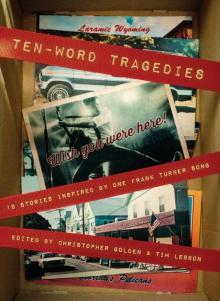 Ten-Word Tragedies
Ten-Word Tragedies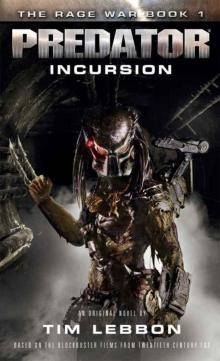 Predator: Incursion
Predator: Incursion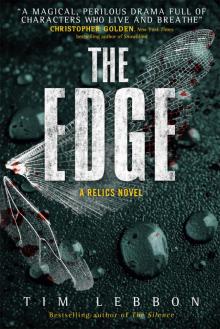 Relics--The Edge
Relics--The Edge Firefly
Firefly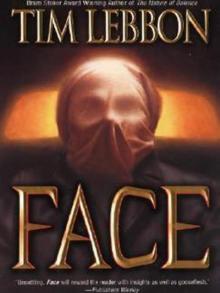 Face
Face Generations
Generations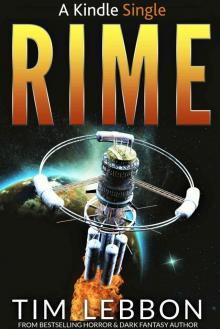 RIME (Kindle Single)
RIME (Kindle Single) Fallen
Fallen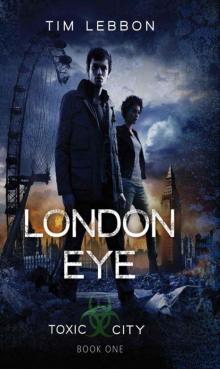 London Eye tc-1
London Eye tc-1 Kong: Skull Island
Kong: Skull Island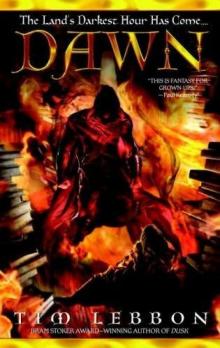 Dawn n-2
Dawn n-2 Into the Void: Star Wars (Dawn of the Jedi)
Into the Void: Star Wars (Dawn of the Jedi)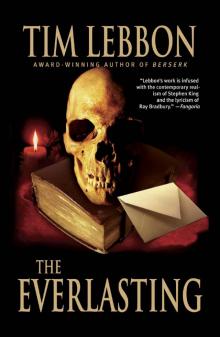 The Everlasting
The Everlasting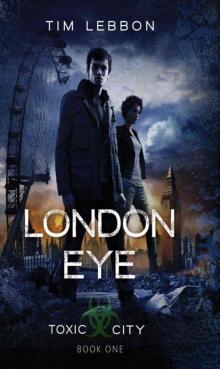 London Eye: 1 (Toxic City)
London Eye: 1 (Toxic City)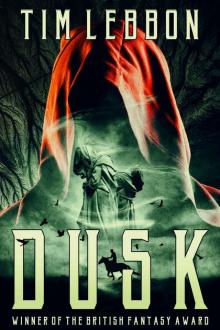 Dusk: a dark fantasy novel (A Noreela novel)
Dusk: a dark fantasy novel (A Noreela novel)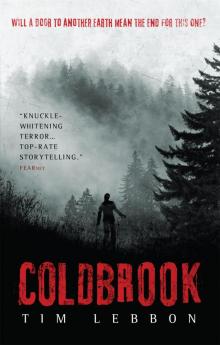 Coldbrook
Coldbrook Alien
Alien Dusk
Dusk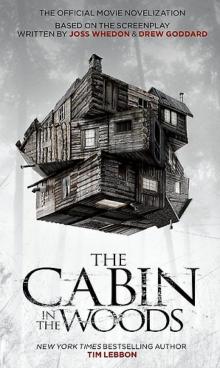 The Cabin in the Woods
The Cabin in the Woods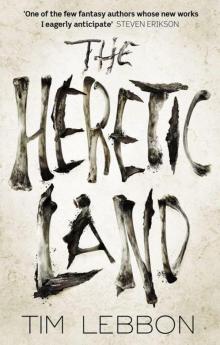 The Heretic Land
The Heretic Land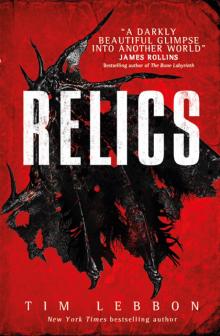 Relics
Relics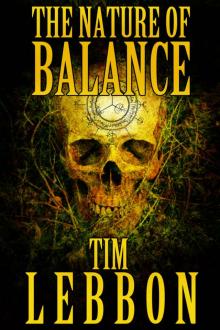 The Nature of Balance
The Nature of Balance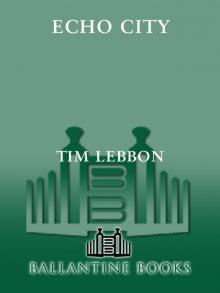 Echo City
Echo City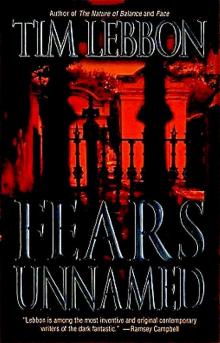 Tim Lebbon - Fears Unnamed
Tim Lebbon - Fears Unnamed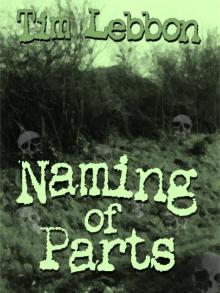 Naming of Parts
Naming of Parts Alien--Invasion
Alien--Invasion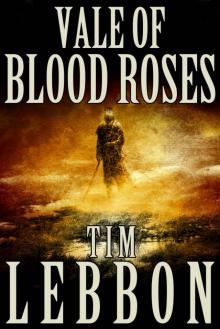 Vale of Blood Roses
Vale of Blood Roses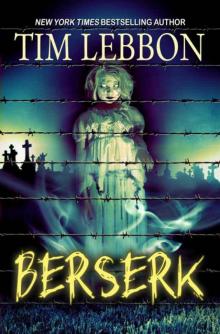 Berserk
Berserk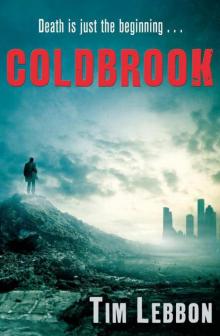 Coldbrook (Hammer)
Coldbrook (Hammer)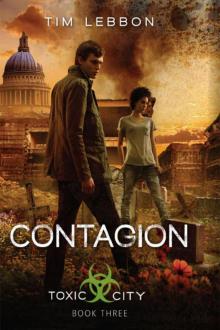 Contagion tc-3
Contagion tc-3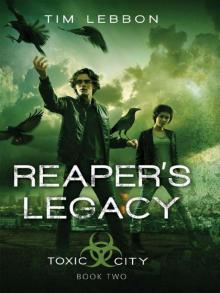 Reaper's Legacy: Book Two (Toxic City)
Reaper's Legacy: Book Two (Toxic City)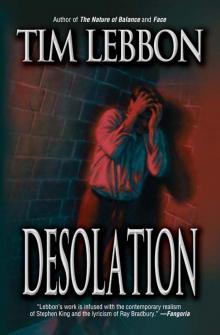 Desolation
Desolation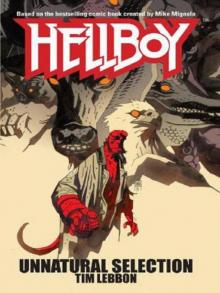 Unnatural Selection
Unnatural Selection Predator - Incursion
Predator - Incursion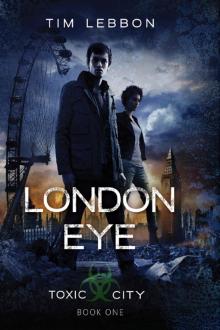 London Eye
London Eye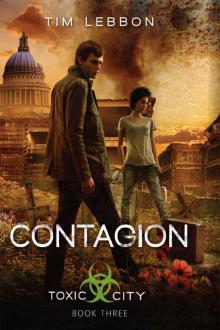 Contagion (Toxic City Book Three)
Contagion (Toxic City Book Three) The Silence
The Silence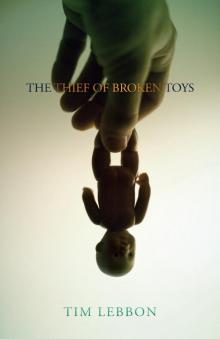 The Thief of Broken Toys
The Thief of Broken Toys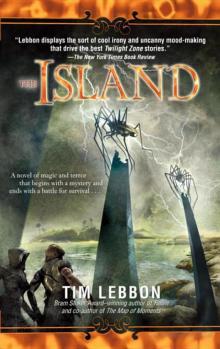 Tales of Noreela 04: The Island
Tales of Noreela 04: The Island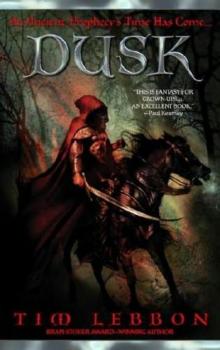 Dusk n-1
Dusk n-1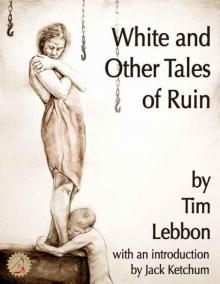 White and Other Tales of Ruin
White and Other Tales of Ruin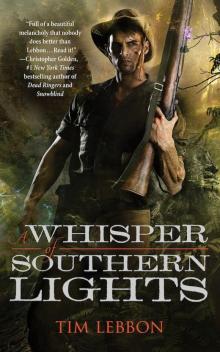 A Whisper of Southern Lights
A Whisper of Southern Lights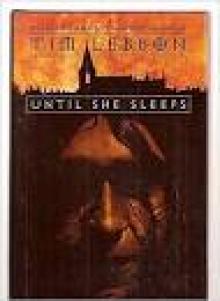 Until She Sleeps
Until She Sleeps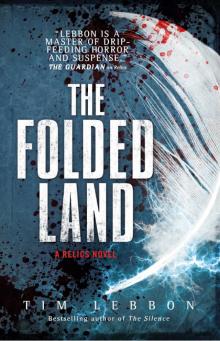 Relics--The Folded Land
Relics--The Folded Land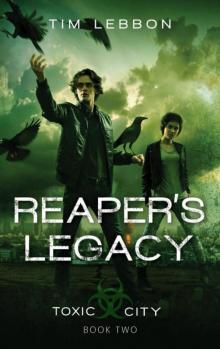 Reaper's Legacy tc-2
Reaper's Legacy tc-2 Alien: Out of the Shadows
Alien: Out of the Shadows Pieces of Hate
Pieces of Hate X-Files: Trust No One
X-Files: Trust No One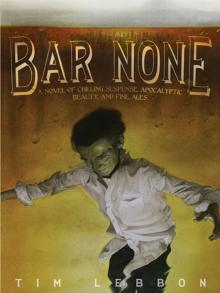 Bar None
Bar None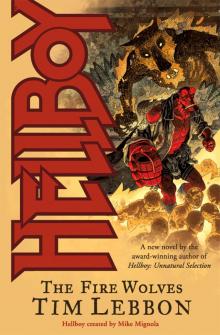 The Fire Wolves
The Fire Wolves